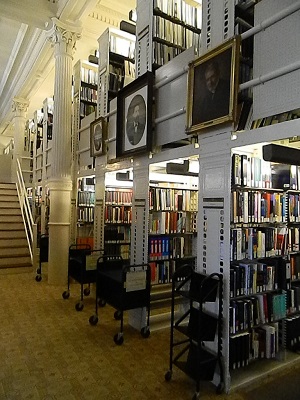This week, the Texas Legislative Reference Library joins libraries across the U.S. in celebrating the dynamic changes that are happening in today's libraries. April 10-16 is National Library Week, a time to highlight the tools and services that modern-day libraries offer to meet the needs of the communities they serve.
 During the interim, our work at the library continues full speed. Forming the backbone to much of this work is an active digitization program that puts legislative history resources online at users' fingertips. As a result of digitization, our patrons can better access library resources, and answering patron questions has been greatly streamlined for our staff.
During the interim, our work at the library continues full speed. Forming the backbone to much of this work is an active digitization program that puts legislative history resources online at users' fingertips. As a result of digitization, our patrons can better access library resources, and answering patron questions has been greatly streamlined for our staff.
Much of our digitization work has been facilitated by the acquisition of high-speed scanners and a book scanner that has enabled us to work with fragile and tightly bound items.
Legislative bill files and committee minutes:
The library is the legal custodian of legislative bill files from the 63rd Legislature (1973) to the present, and scanning these bill files, as well as older bill files in the collection of the Texas State Library and Archives Commission, is one of our major ongoing projects. After bill files are scanned, they are made available online through our Legislative Archive System. This system offers basic and advanced searching, and adds value to bill files by linking related newspaper clips, interim reports, and other resources. The system currently contains bills files going back to the 33rd Legislature (1913), and scanning for earlier sessions is in progress.
In a related project, the library has been scanning legislative committee minutes. These are made available through a standalone database on our website, and have also been incorporated into the Legislative Archive System.
Newspaper clipping service:
The library's daily newspaper clipping service began in the early 1970s, and for many years was assembled by cutting articles out of newspapers and pasting them onto sheets of paper. In the last decade, "the clips" has evolved into a nearly paperless service, with articles distributed digitally, and the availability of an online, searchable database of clips. Since many Texas newspapers do not provide historical indexes, the clips database is a favorite, and often crucial, tool for background research, allowing capitol staff to search by subject, headline, or author for articles back to 1901.
For the past several years, each article in the clips has also been linked to any bills, court documents, or reports mentioned in the article. This valuable service makes it simple to locate a list of articles about a bill or to provide a copy of reports and studies referred to (often vaguely) in articles. A recently added feature groups together key court documents related to a case mentioned in a newspaper article.
House and Senate journals:
The library began scanning journals in 2006 with a goal of making the complete collection of House and Senate journals from the Republic of Texas (1836) to the present available online. Legislative journals are a rich source of information that contain the proceedings of the legislature on any given day of session, as well as speeches, gubernatorial documents, and in some cases, legislative research reports. They are often the only source of legislative history for early bills.
Since the start of the project, journals from the Republic of Texas (1836) through the 28th Legislature (1903) have been digitized and put online, and most journals from 1951 through the present are also available online. Future phases of the project include making the digitized journals text-searchable and integrating them into the Legislative Archive System.
Members of the Texas Legislature:
During the interim, many of our projects focus on recapturing the history of the Texas Legislature and making it available online. Not long ago, answering simple questions about a member's term of service or committee membership required consulting a card file and stacks of books, and more complicated questions might have required days or weeks of intricate research. All that has changed since the library developed the Texas Legislators: Past and Present database, which digitized much of the information contained in our card files and stores member-related information we have compiled from journals and other sources. Today, many of the member-related questions we receive can be answered through a simple database query.
Vetoes and constitutional amendments:
Over the past several years, we have built databases to store detailed information on specialized topics such as vetoes and constitutional amendments. As part of the project, we collect and scan original documents like veto messages issued by the governor. Having this information has enabled us to answer a variety of questions more easily and more quickly. Our vetoes system is particularly useful after the end of a legislative session, and our constitutional amendments system is heavily used leading up to an election in which proposed constitutional amendments are on the ballot.
The library has other digitization projects in addition to those mentioned here, and we are happy to answer questions about them. We aim to provide the best tools and services available for Texas legislative research.

